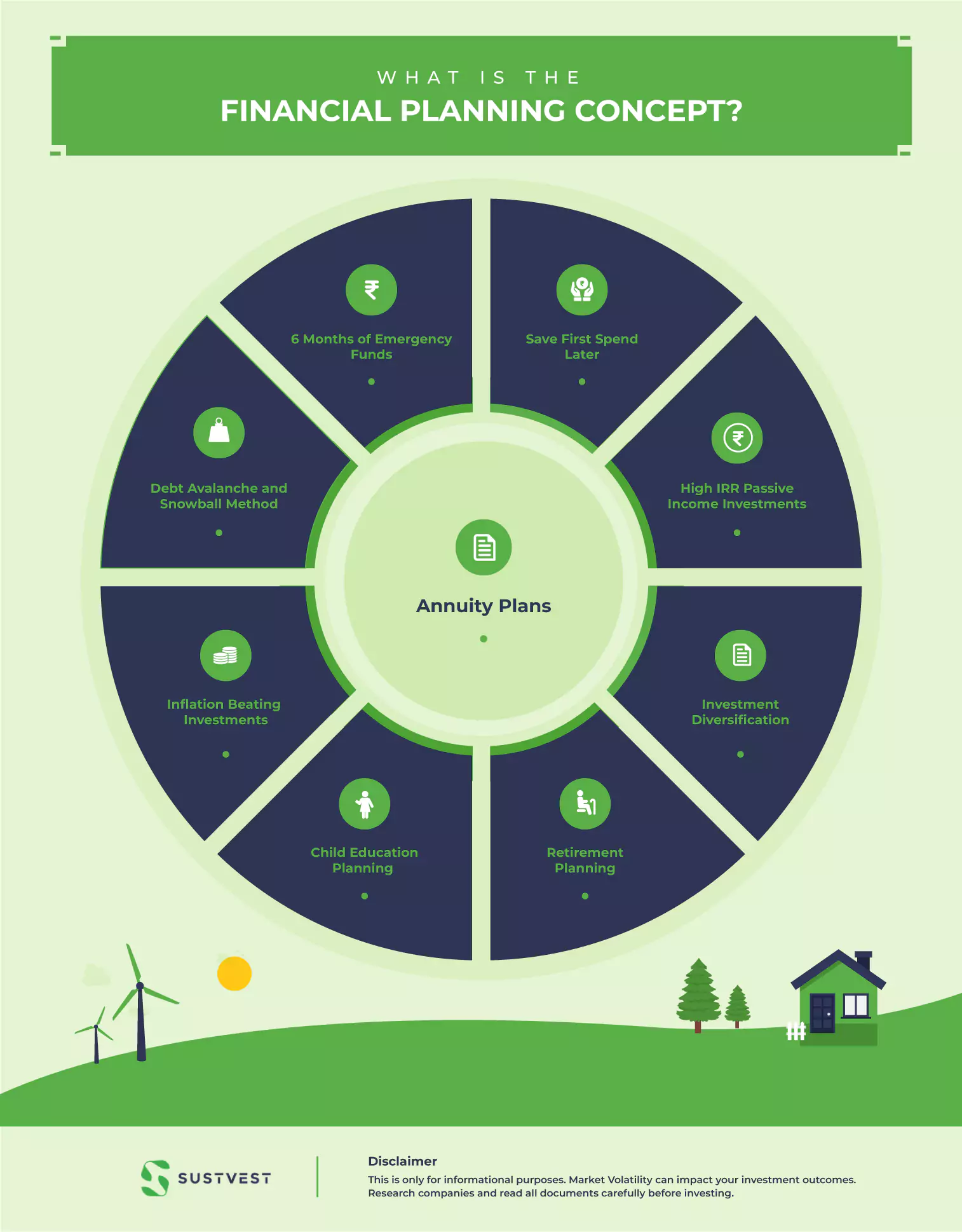There’s a famous saying: “Half the battle is won with just planning”. This same notion applies to your finances. Over the last two decades, our quality of life has skyrocketed.
So, when you’re mapping out your financial plan for the next twenty years, keeping these financial planning concepts in mind will help you stick to your financial planning strategy religiously.
This approach is essential for tackling unexpected financial events like pandemics, unemployment, healthcare costs, market shifts, inflation, recessions, etc.
Now, let’s dive into eight financial planning concepts that serve as a roadmap for your future.

What is the Financial Planning Concept?
Financial planning concepts are customized strategies that streamline your financial journey. Whether you’re aiming for retirement security, funding your child’s education, or even planning a dream vacation, these concepts provide a structured approach.
Building a strong financial foundation empowers you to make confident choices without jeopardizing your investments or depleting your savings.
Think of these concepts as personalized guidelines that propel you towards your unique financial goals with efficiency and assurance.
Let’s now dig into the 8 fundamental financial concepts that chart the course toward achieving financial freedom and other important financial goals.
| 8 Financial Planning Concepts For Securing Your Future 6 Months Emergency Funds Save First Invest Later Debt Avalanche and Snowball Method High IRR Passive Income Investments Inflation Beating Returns Investment Diversification Child Education Planning Retirement Planning |
- 6 Months of Emergency Funds
Imagine a hypothetical scenario: a family member falls ill, and you’re their primary caregiver. Can you sustain the family on your savings without leaving your job? Similarly, if you leave your job to pursue better opportunities, settling for a low-paying position isn’t ideal when you have responsibilities.
In such times of contingency, you need an emergency fund. Begin by calculating your monthly essential expenses: rent, utility bills, food, and groceries. For instance, if this sums up to 20,000 rupees, setting aside 120,000 (equivalent to 6 months’ expenses) offers you financial freedom.
Whether for caring for loved ones or pursuing your career goals without undue rush, Keeping an emergency fund prevents debt, safeguards your investments, and prepares you for lifelong financial challenges.
Now the question arises: Where should you store the emergency fund? Opt for an accessible and liquid account. Consider a savings account from a reputable bank or liquid mutual funds. This strategy offers a safety net, aligned with crucial financial planning concepts, for handling unexpected economic turns effectively.
- Save First Spend Later
At the outset of your investing journey, avoid the common trap of falling into the “spend first, invest later” mindset. Instead, embrace the reverse approach: “Invest first, spend later.”
Millennials and Gen Z today enjoy more fun activities every month than people did twenty years ago. They use streaming services, eat out, and shop online, making personal spending more important than before.
Imagine if you spent before saving; your investment potential would be restricted. However, adopting the “save first, then invest” approach helps you identify crucial expenses, cut needless ones, and align with core financial planning principles, streamlining money management while curbing wasteful outflows.
This financial planning concept not only helps you manage money better but also encourages you to track your monthly earnings and spending accurately, promoting smart financial choices. Ultimately, putting savings first sets you up for a stronger financial future.
- Debt Avalanche and Snowball Method
Clearing off debt is a key step in building wealth. It lightens your financial load and opens the door to growing wealth by freeing up money for investments. The starting point is tackling your debts head-on.
Paying off a loan quicker helps cut down the principal amount sooner, leading to lower overall interest payments. This means saving on interest and having more funds available for investment, especially in your 30s.
Experts propose two effective methods for debt payment: Avalanche & Snowball Method.
With the Avalanche Method, focus on debts with the highest interest rates first, then work your way down to lower rates. This approach leaves more money for investing, fostering wealth growth.
The Snowball Method emphasizes beginning with your smallest debts and gradually moving to larger ones. Clearing small debts early boosts your motivation to tackle larger ones, freeing up more money for investment and advancing wealth growth.
- High IRR Passive Income Investments
While investors primarily seek to maximize ROI, the Internal Rate of Return (IRR) introduces a fascinating dynamic by factoring in timing and revealing an annualized rate at which an investment’s value reaches zero.
Let’s look at Sustvest, a sustainable option. Invest a modest 15,000 in a solar rooftop project and gain an impressive 15% return. Illustrating how eco-friendly choices like Sustvest not only support the environment but can also potentially yield higher returns, as seen through the IRR lens.
- Inflation Beating Investments
Indians have a soft spot for Fixed Deposits (FDs). Yet, consider the eroding value of money tied up in an FD. As time passes, you’ll need more funds to maintain your purchasing power. To counter this, it’s imperative to invest in high-interest yielding assets like equity, debt securities, stocks, real estate, mutual funds, and instruments such as Sustvest.
Sustvest offers a 15% return, surpassing the current inflation rate of 7%. Other options include both traditional and alternative investments, such as stocks, mutual funds, and currencies. These avenues beat inflation, help your wealth grow, and increase your purchasing power.
Inflation-beating investments align with core financial planning concepts, ensuring your investment aren’t just stagnant, but are growing in a manner that secures your financial future.
- Investment Diversification
A relative of mine had invested solely in real estate, and when COVID hit, his tenants couldn’t pay rent due to lockdowns. Needless to say, those three months brought about massive financial challenges, but they also imparted a vital financial planning lesson.
The essence is simple: diversify your investments across various options, including sustainable ones like renewable energy.
A prudent blend of debt, equity, and real estate could have provided a safety net, supporting his household during those critical times. Underscoring the importance of financial planning concepts in safeguarding your investments against unforeseen circumstances..
- Child Education Planning
Gone are the days when a single salary sufficed to fund a child’s education up to college. Today, foreign studies have become common, and even kindergarten expenses can reach a lakh annually.
These trends underscore a crucial financial planning concept: relying solely on a salary won’t cover your child’s education costs. Early planning, starting from your child’s birth, is imminent.
The government offers numerous savings schemes for the girl child, while a mix of PPF, Post Office Savings Schemes, and Mutual Funds are available for the boy child. This targeted approach ensures you’re prepared to provide quality education, regardless of gender.
The importance of this financial planning concept cannot be overstated when it comes to securing your child’s educational journey.
- Retirement Planning
Amidst a life dedicated to earning for yourself and your family, retirement stands out as a pivotal consideration. Retirement planning emerges as a critical financial planning concept encompassing diverse goals.
Firstly, it ensures you can lead your life on your terms while covering essential expenses. Secondly, it guarantees a steady income stream. Thirdly, it fulfils aspirations for travel and exploration. Lastly, it enables leaving a meaningful legacy behind.
Various investment choices are available, from ULIPs and NPS to renewable energy investments, senior citizen savings schemes, and mutual fund portfolios. It’s also wise to consider well-placed gratuity fund investments.
These avenues align with your goals, demonstrating the significance of meticulous retirement planning within financial planning concepts.

Summing Up
In this exploration of financial planning concepts, we’ve uncovered some impacting strategies that pave the way for a secure future. From emergency funds to retirement planning, these concepts offer a comprehensive roadmap for financial well-being.
Diversifying investments, combating inflation, securing education for your children, and planning for retirement are all crucial steps in achieving financial stability. These concepts serve as guiding lights in an ever-changing financial world.
Embracing these principles isn’t just about knowledge; it’s about empowerment. They equip you with the tools to navigate uncertain times wisely. With foresightful early planning and tactful execution, you pave the road to financial triumph – a journey that promises a brighter future for both you and your loved ones.
For more personalised advice, explore SustVest—a great platform to kickstart your financial planning journey.

Founder of Sustvest
Hardik completed his B.Tech from BITS Pilani. Keeping the current global scenario, the growth of renewable energy in mind, and people looking for investment opportunities in mind he founded SustVest ( formerly, Solar Grid X ) in 2018. This venture led him to achieve the ‘Emerging Fintech Talent of the Year in MENA region ‘ in October 2019.




